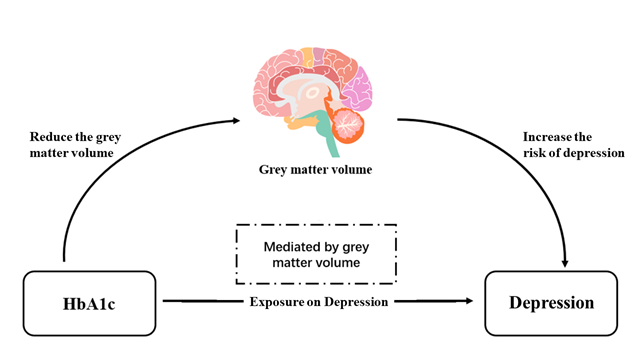The Impact of Glycemia on Depression Risk: Insights into the Role of Brain Gray Matter Volume
Published 13 July, 2023
Depression remains a significant public health concern, imposing a substantial health burden on individuals worldwide. While research has identified glycemia as a potential risk factor for depression, the specific biological mechanisms underlying this relationship are not yet well understood.
To that end, in a new study published in the KeAi journal Global Transitions, a team of Chinese researchers put forward a new hypothesis suggesting that reduced GMV may mediate the association between glycemia and depression.
"Depression often emerges as a complication of diabetes, and previous research has revealed a correlation between fluctuations in blood sugar levels and the onset of depression," explains lead author Dashan Zheng from Sun Yat-sen University. "Furthermore, multiple studies have indicated that changes in brain structure and function contribute to the development of depression. Therefore, we hypothesize that one possible mechanism underlying the comorbidity of diabetes and depression is the influence of blood sugar on brain structure and function, which in turn affects the risk of depression.”
To test this hypothesis, the team examined the mediation effect of GMV on the association between HbA1c and depression. The study was based on the UK Biobank, a prospective cohort of more than 500,000 participants aged 40–69 years old recruited from 22 assessment centers across the UK, between 2006 and 2010.
The team observed a significant correlation between elevated levels of glycosylated hemoglobin, HbA1c, reduced gray matter volume (GMV), and depression. They found that lower GMV was associated with depression. Interestingly, these associations were stronger in individuals with prediabetes compared to those with diabetes or without diabetes, as well as in participants aged 60 years and above compared to those below 60 years old. Furthermore, they observed that the link between HbA1c and depression was partially mediated by GMV reduction with a proportion of 6.82%.
Hualiang Lin, at the same university and corresponding author of the study, emphasized that this research marks a substantial breakthrough in comprehending the connection between blood sugar levels and depression.
“Given the global aging phenomenon, elevated blood sugar levels can contribute to heightened brain damage within the population. Maintaining effective control of blood sugar levels, particularly among older individuals, can exert a positive influence on brain health and potentially reduce the risk of developing depression,” Lin says.

Image: The associations between HbA1c, grey matter volume, and depression: Dashan Zheng
Contact author name, affiliation, email address: Hualiang Lin, Department of Epidemiology, School of Public Health, Sun Yat-sen University, #74 Zhongshan Road 2, Yuexiu District, E-mail: linhualiang@mail.sysu.edu.cn.
Funder: This work was supported, in whole or in part, by the Bill & Melinda Gates Foundation [Grant Number: INV- 016826].
Conflict of interest: The authors declare that they have no known competing financial interests or personal relationships that could have appeared to influence the work reported in this paper.
See the article: Zheng, D., et al., The associations of glycosylated hemoglobin with grey matter volume and depression: Investigating mediating role of grey matter volume. Global Transitions, 2023. 5: p. 107-116. https://doi.org/10.1016/j.glt.2023.06.004.